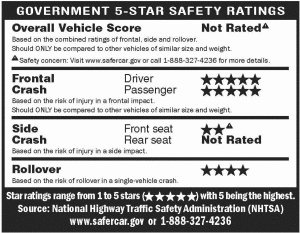
Bipartisan bill would mandate anti-crash technology for NHTSA 5-star rating
By onLegal | Repair Operations | Technology
Two days after the National Transportation Safety Board recommended making automatic braking and collision warnings standard, bipartisan teams in the U.S. House and Senate announced Wednesday a bill making various advanced anti-collision technology part of the federal five-star crash rating.
The bills sponsored in the House (H. 2702) by U.S. Reps. Earl Blumenauer, D-Ore., and Todd Rokita, R-Ind., and Senate (S. 1535) by U.S. Sens. Dean Heller, R-Nev., and Edward Markey, D-Mass., would make technology like collision alerts, blind-spot detection, lane-department warnings, and assisted braking necessary to clinch a 5-star rating from the National Highway Traffic Safety Administration.
In January, U.S. Transportation Secretary Anthony Foxx said the government planned to recommend two types of automatic braking systems as part of the New Car Assessment Program customer checklist. The first type hits the brakes automatically if a crash looks likely and a driver isn’t braking. The other, dynamic brake support/assisted braking, puts more pressure on the brakes if the driver isn’t hitting them hard enough to avoid a crash.
It’s not immediately clear if the NTSB referred to true automatic braking — the car sees an obstacle and stops — versus the assisted braking also lumped into the NHTSA’s proposal. The NTSB references its fellow agency’s guidelines for automatic braking in its recommendations, which followed this detailed report on technology to avoid rear-ending.
“Consumers trust auto window-sticker safety ratings when they compare vehicles,” U.S. Sen. Edward Markey, D-Mass., said in a statement. “Today’s 5-star safety rating system only tells them how safe they are in the vehicle once a crash occurs, ignoring any features like collision warning and automatic emergency braking, that can help avoid that crash in the first place. With new safety technology standard in many cars, we need a 21st century 5-star safety rating system that tells consumers how safe their vehicles really are,”
Such technology is growing in popularity, though not all of it comes standard. It should likely be even more rapidly adopted with or without the bills. In April, Toyota announced that its vehicles would offer cheap crash prevention systems in the U.S., and Nissan said it would make automatic braking standard in Japan.
“In a free market, informed consumers are one of the greatest drivers of advancement,” Rokita said in a statement. “The Safety Through Informed Consumers Act ensures that the latest safety technologies are integrated into the 5-star rating system, arming new car buyers with potentially life-saving information. This is a common-sense, bipartisan bill that promotes innovation, empowers consumers, and protects lives. I thank my colleagues for their support and look forward to working with them to advance this important legislation.”
Progressive’s CEO in May said forward collision warnings — including systems with and without true automatic braking — have already cut into Progressive’s collision claims volume, and while claim severity increased in some cases, the insurer was seeing decreased loss ratios. That translates into less money earned by collision repairers overall.
The bill’s language is pretty simple, stating simply that: “Not later than 1 year after the date of the enactment of the Safety Through Informed Consumers Act of 2015, the Secretary shall ensure that crash avoidance information is provided next to, and in the same format as, crashworthiness information at each place that crashworthiness information is made available to the public under this section.”
The Alliance of Automobile Manufacturers opposed the bill, the Detroit News reported.
“Consumers want to be in the driver’s seat when it comes to deciding on how they spend their safety dollars, and automakers agree. Consumers should be deciding what vehicles they drive and what technology is in those vehicles,” spokeswoman Gloria Bergquist told the newspaper.
More information:
“Key Bipartisan, Bicameral Auto Consumer Protection Legislation Introduced”
U.S. Sen. Ed Markey official site, June 10, 2015
“Bill would add high-tech features to new car stickers”
Detroit News, June 10, 2015
Featured image:
A sample 5-star safety rating from the government depicts a vehicle in which one would not want to get T-boned. (Provided by Federal Register)
